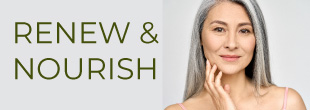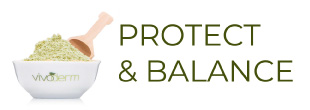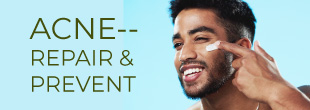Dry Skin Diet Tips and the Mediterranean Diet
We all know how important diet is to building healthy, beautiful skin. But did you know eating the right foods and avoiding the wrong ones can actually help prevent wrinkles and minimize the signs of aging?
According to a recent article in the UK’s Daily Telegraph, “Eating a Mediterranean diet can halve the risk of the most dangerous form of skin cancer, research suggests.” The recent study may eventually prove regular intake of fruit, vegetables, nuts and fish may protect against malignant melanoma.
The” Mediterranean diet,” which features plenty of vegetables, legumes, and olive oils, may be a catalyst for the body to absorb and benefit from fat-soluble antioxidant vitamins and phytochemicals, such as vitamin E, lycopene, and isoflavones. In this light, organic produce has been shown to contain a higher level of beneficial antioxidants than conventionally raised fruits and vegetables.
So, what does all this mean if you suffer from dry skin or sensitive skin? With dry skin issues, it is important to get the right types fats into your diet. But what are the right types of fats? For example, increased intake of saturated fat and monounsaturated fat in the diet has been associated with a decrease skin hydration. So consuming some saturated fats but not too many, seems to be best.
Countless studies show that an omega-3 fat deficiency is associated with dry skin and skin problems like eczema. That’s why it is important to consume adequate amounts of these essential fats, found in fatty fish, fish oils, flaxseeds, flaxseed oil, etc.
Be aware of the difference from the omega-6 polyunsaturated vegetable oils (including corn, canola, and safflower), formerly hailed as healing for the heart. Meaning, most need to eat more omega-3s and less omega-6 oils.
The dairy products you eat (and avoid) can also make a difference in skin aging. Butter, full-fat milk, margarine, and sweets should be minimal, while yogurt, cheese, and reduced-fat milk are neutral in their aging effects.
The epidermis (upper layer of the skin) is composed of 25 percent monounsaturated fatty acids. In the cell membranes, both monosaturated fats and saturated fats resist oxidation, a key process in cellular aging. Omega-6 polyunsaturated oils, on the other hand, contribute to the production of free radicals, the by-products of oxidation – also the cause of the skin aging process. This would increase both wrinkling and the risk of developing skin and other cancers, including melanoma. Polyphenols, found in fresh fruits, vegetable and herbs can protect the body’s cells against the damaging effects of oxidative stress, a process by which oxygen-rich molecules can attack and destroy cells in much the same way as rust rots a car.
Therefore, it is beneficial to eat more olive oil (a monounsaturated) while avoiding omega-6 polyunsaturated oils, such as corn, canola, safflower and others. Included in this list of foods to avoid, are the trans fats, present in margarine, most baked goods, fried, processed foods, and sweets, which are oxidized polyunsaturates, making them even more detrimental. In certain studies they have been shown to block healthy Omega -3 fats. High trans-fats content may interfere with the hormonal pathways needed for healthy fat metabolism and preventing inflammation.
Consuming the omega-3s and avoiding unhealthy oils that block them will help the body absorb the vital lipids needed in the skin cells and improve the hormonal actions. Since skin aging is caused by hormonal shifts that occur naturally in the aging process, it’s best to eliminate the polyunsaturated and trans fats as much as possible.
Fish oils and fish are the purest sources of omega-3 fatty acids,which can increase the lipid content of your cells. These fats have been shown to improve psoriasis and other severe dry skin conditions. If you are pregnant or nursing, please be aware of the mercury content in your fish – which has been shown to cause detrimental effects to mothers, and young children, so supplements may be the best way of obtaining these fats vital to skin health.
Dry, sensitive, and wrinkled skin can also be helped with a diet rich in antioxidants obtained from fresh fruits and vegetables, such as spinach, kale, collard greens, turnips, romaine lettuce, broccoli, leeks, corn, peppers, peas, and mustard greens. Egg yolks and oranges contain the antioxidant lutein. Lutein is an important natural antioxidant that may help your eyes stay healthy while maintaining the health of your skin.
So, to recap your skin-healthy diet should include:
• Fats from whole foods-nuts, seeds, olives, and avocados
• A wide variety of whole plant foods
• Monounsaturated fats, such as olive or nut oils
• Good sources of omega3 oils (never heated) or in capsule form
• Moderate use of omega-6 oils (corn, safflower, canola and soy oils)
• Limited amounts of processed foods and deep-fried foods
• Pure sources of omega3 fats, including a source of essential fatty acids (EFA)




